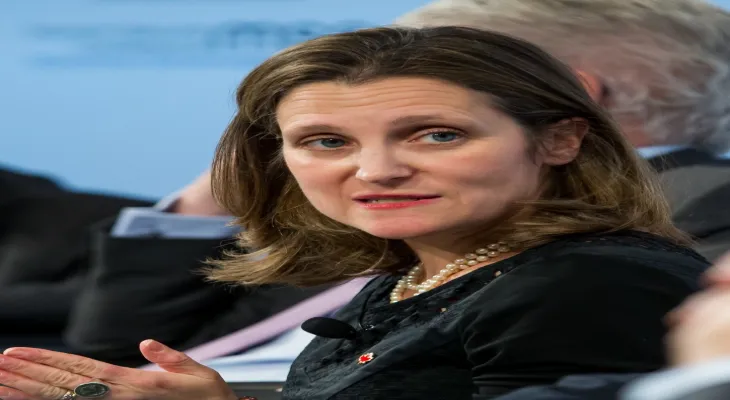Search here
Newspaper
Search here

Arab Canada News
News

Published: November 25, 2022
Yesterday, Deputy Prime Minister and Minister of Finance Kristia Freeland appeared before the Rouleau Committee, where she said that the threat to Canada's economic security poses a threat to all Canadians.
The inquiry committee chaired by Judge Paul Rouleau is mandated to determine whether there was justification for the Liberal government of Justin Trudeau in Ottawa to invoke the Emergencies Act on February 14, aiming to end the protests by truck drivers and other demonstrators opposing health measures related to the COVID-19 pandemic.
Freeland also focused before the committee on how blockades and protest gatherings on roads can harm the Canadian economy, notably by causing "irreparable damage" to trade relations with the United States, Canada's primary trading partner.
Freeland began her testimony by recalling the context of the months leading up to the February 2022 protests. At that time, Canada was already fearing a trade war with the United States, which was preparing the "Build Back Better Act," a bill providing financial incentives for car manufacturers to produce vehicles within the U.S.
Freeland also pointed out that the protests of truck drivers opposing health measures related to the COVID-19 pandemic, especially those that led to the closure of the Ambassador Bridge, gave Americans an additional argument to promote protectionism in the auto industry. The Ambassador Bridge links the city of Windsor in Ontario with the city of Detroit in the U.S. state of Michigan, and is the busiest border crossing in North America.
Freeland's concerns were confirmed later during a meeting with heads of major Canadian banks on the evening of Sunday, February 13, i.e., on the eve of Prime Minister Justin Trudeau's invocation of the Emergencies Act to end the protests.
The meeting was described as "very unusual," as Freeland said several times, emphasizing the seriousness of the situation. According to the meeting minutes, banking leaders confirmed that Canada's reputation was "at risk." "A decline in investments could lead to job losses for Canadians and a reduction in their overall standard of living. (...) And I had to steer the ship; I have a great and deep responsibility to Canadians," Freeland added emotionally before the committee.
Also, the Rouleau Committee asked the Deputy Prime Minister about the connection between a national security threat and an economic threat, to which her response provided perhaps the clearest idea so far about the logic upon which the government relied to invoke the Emergencies Act, as Freeland explained that the government had to find a way to swiftly end those protests, which were causing significant harm to the Canadian economy, adding: "We looked at the tools available at that stage and concluded that everything we could use had already been used."
As a reminder, the federal Prime Minister Justin Trudeau will appear today before Judge Rouleau's committee.
Comments